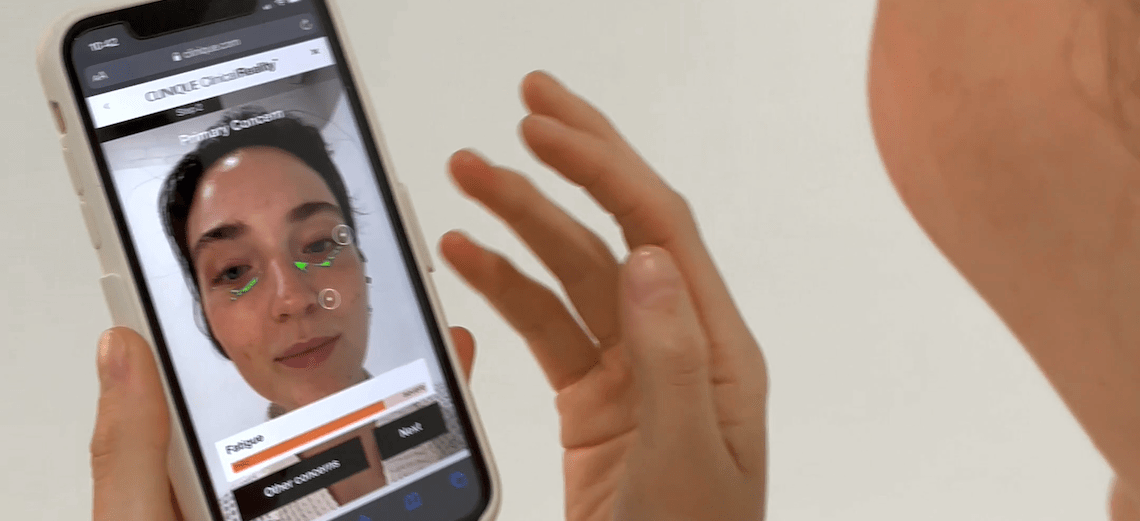Going into physical stores may be appealing now that Omicron has receded, but beauty brands are still betting on digital AI recommendation tools.
Clinique, for example, recently expanded the functionality of its Clinical Reality virtual skin diagnostic tool, adding a hydration analysis feature last month. It’s the latest in a series of new virtual functions added to the site during the pandemic. And DTC site investments aren’t slowing down as the brand bets on an omnichannel future.
AI skin analysis “technology continues to advance because the demand is advancing,” said Carolyn Dawkins, svp of Clinique global online, consumer engagement & product marketing. “Phone cameras have become so much more sophisticated.”
The new hydration analysis looks at microtextures, skin surface topography and redness to identify dryness. Based on the results from the scan, the brand then offers personalized product recommendations for the consumer on its site. In addition, the data is a “key component of CRM,” said Dawkins, and the brand adjusts marketing messaging for the consumer, targeted to their specific skin concerns. It has been in development for two and a half years.
With Covid-19 case numbers receding in the U.S. and many other countries, omnichannel connections between site and store are also a priority for the brand. Clinical Reality is promoted in-store via a QR code.
“Everyone’s throwing this word around: ‘omni.’ We know it’s so important, and we’re seeing more of that than ever before,” said Dawkins.
As part of its omnichannel strategy, the brand also recently launched near-field communication (NFC) chips — the kind you see on contactless credit cards — on the packaging of a limited edition of its Moisture Surge products. They lead to a microsite experience. Content on the microsite includes skin-care advice and “a daily dehydrator index” showing causes of skin dehydration.
For brands, AI beauty tools have gone from a fun pre-pandemic novelty to a serious alternative to in-store testers and product recommendations. Clinique also added an AI foundation shade-matching tool to its site in 2o20 as brands have claimed to make great leaps in digital shade-matching accuracy throughout the pandemic. AI skin-care analysis has become an increasingly adopted feature used by brands across the industry over the course of the pandemic.
Clinique first launched its facial skin analysis tool, Clinical Reality, in May 2019 and made it available globally. In addition to the new hydration tool, it scans for pores/uneven texture, uneven skin tone, fatigue, irritation, redness, acne, wrinkles and loss of volume/sagging. Since the feature was introduced, it has conducted over 1 million scans, with pores and uneven texture the top skin concern, followed by fatigue, according to Dawkins.
Developed with Perfect Corp., the tool has increased conversions by 2.5 times with a 30% larger basket size. It has also caused a fivefold increase in “dwell time,” with users staying on the site for an average of 10 minutes after the diagnostic, according to Clinique.
While the 54-year-old brand may have originally relied on the department store beauty counter to deliver recommendations, the new AI tools are an adaptation to the demands of younger consumers.
“Younger consumers over-index with the use of these high-tech diagnostics,” Dawkins said. “It’s credible and it gets them to engage with the brand.”
The tool is the latest in Clinique’s overall tech investments. The company has been developing its DTC site capabilities during the pandemic, including by adding shoppable livestreaming, 1:1 consultations and live chat to recommend products in 2020. In October 2021, it became the first brand in Estée Lauder Companies’ portfolio to launch an NFT.
Clinique saw double-digit growth in skin-care sales, according to ELC’s earnings report for its most recent quarter.
“Anyone who has a technology product in the market, whether you’re Clinique or you’re Google, you’ve got to keep up, in terms of shifting the benefits and the features to make sure you’re relevant for the consumer,” Dawkins said.




